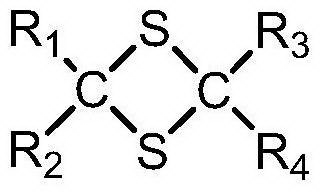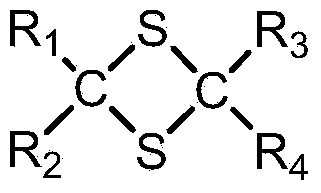Non-aqueous electrolyte, preparation method of non-aqueous electrolyte as well as lithium ion battery
A non-aqueous electrolyte and lithium salt technology, applied in the direction of non-aqueous electrolyte storage battery, electrolyte storage battery manufacturing, secondary battery, etc., can solve the problems of affecting the electrochemical performance of the battery, high loss, low Coulombic efficiency, etc., and achieve improved cycle stability Sex and high temperature, reduce dissolution, improve the effect of stability
- Summary
- Abstract
- Description
- Claims
- Application Information
AI Technical Summary
Problems solved by technology
Method used
Image
Examples
Embodiment 1
[0030] Non-aqueous electrolyte mainly includes organic solvent, conductive lithium salt and additives. The organic solvent is composed of cyclic carbonate solvent (ethylene carbonate EC) and linear carbonate solvent (ethyl methyl carbonate EMC). EC and wire The weight ratio of type carbonate is EC:EMC=1:2. The conductive lithium salt LiPF 6 The concentration in the organic solvent is 1.0mol / L, and the commonly used additives are vinylene carbonate in an amount of 1wt.% and propane sultone in an amount of 1wt.%, and the additives are 2,2,4,4 -Tetrafluoro-1,3-dithietane, the dosage is 0.1wt.%.
[0031] The preparation method of electrolyte is:
[0032] (1) Mix the organic solvents in proportion and use them Molecular sieve, calcium hydride, lithium hydride purification, impurity removal, water removal;
[0033] (2) Dissolving the conductive lithium salt in the above-mentioned organic solvent at room temperature, and stirring evenly;
[0034] (3) Add commonly used additives...
Embodiment 2
[0038] The preparation method of the non-aqueous electrolyte solution of this embodiment is the same as that of Example 1, except that 0.5wt.% of 2,2,4,4-tetrafluoro-1,3-dithietane is used , the non-aqueous electrolyte thus prepared was applied to a full battery to test its performance in the same manner as in Example 1.
Embodiment 3
[0040] The preparation method of the non-aqueous electrolytic solution of this embodiment is the same as that of Example 1, the difference is that 2,2,4,4-tetrafluoro-1,3-dithietane is used in an amount of 1wt.%, The non-aqueous electrolyte thus prepared was applied to a full battery to test its performance in the same manner as in Example 1.
PUM
 Login to View More
Login to View More Abstract
Description
Claims
Application Information
 Login to View More
Login to View More - R&D
- Intellectual Property
- Life Sciences
- Materials
- Tech Scout
- Unparalleled Data Quality
- Higher Quality Content
- 60% Fewer Hallucinations
Browse by: Latest US Patents, China's latest patents, Technical Efficacy Thesaurus, Application Domain, Technology Topic, Popular Technical Reports.
© 2025 PatSnap. All rights reserved.Legal|Privacy policy|Modern Slavery Act Transparency Statement|Sitemap|About US| Contact US: help@patsnap.com



